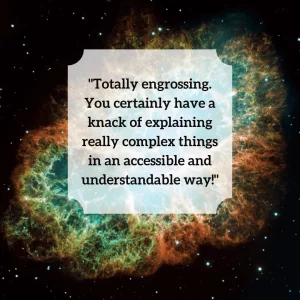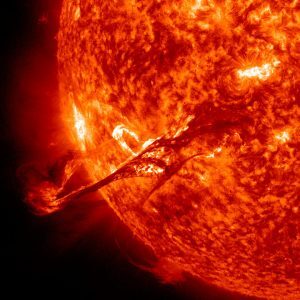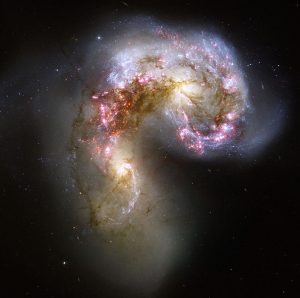Your jargon free introduction to astrophysics with no maths
This online beginners course is the perfect way to discover the wonders of our universe.
You’ll be joining me on a epic journey across the cosmos. Starting at the Sun, you’ll venture ever further out until you reach the very edge of the observable universe. Your trip will take in black holes, exploding stars, mysterious dark matter, alien planets and even the possibility of other versions of you in parallel universes. By the end you’ll be right up to date with our best theories of how the universe works.
What have previous students said?
Average rating for the course out of 10
%
Students who said they'd study another course with me



Watch a sample module
What will I learn?
Part 1: The Solar System

Key topics: solar physics, planetary science and solar system formation
Uncover the inner workings of the Sun, the origin of sunspots and the immense power of space weather. You’ll also find out where the solar system came from, why it looks the way it does, and where it ends and the rest of space begins.
[image: a coronal mass ejection from the Sun (NASA/SDO)
Part 2: Stars and Alien Worlds

Key topics: alien planets. the life cycle of stars and black holes
Discover the thousands of planets we’ve spotted beyond our solar system and consider whether any of them could be home to life. You’ll also tour the nearest star factory to Earth and see how stars are born. Then learn how they die to produce cataclysmic supernovas, gargantuan black holes and rapidly spinning pulsars.
There’s even a chance to hear about exciting new discoveries like gravitational waves and outlandish ideas such as string theory.
[image: the Crab Nebula as seen by the Hubble Space Telescope]
Part 3: The Milky Way

Key topics: spiral galaxies, dark matter & SETI
We’ll investigate the Milky Way’s size, age and shape and explain those distinctive spiral arms. But there’s a lot more to a galaxy like ours than meets the eye. You’ll meet the supermassive black hole that lies at its heart and learn about the mysterious dark matter that seems to be acting like a gravitational glue holding the whole galaxy together. There’s time, too, to check in on our Search for Extra-Terrestrial Intelligence (SETI) and assess the chances of finding advanced civilisations elsewhere in the Milky Way.
[image: artist’s impression of the Milky Way – NASA]
Part 4: Galaxies

Key topics: different types of galaxies & measuring cosmic distances
Our Milky Way is just one of two trillion galaxies in the universe. Visit some of our nearest neighbours, discovering eerie similarities and vast differences. We’ll talk about the likely future collision between the Milky Way and the Andromeda galaxy, as well as how galaxies cluster together to form the overall structure of the universe. I’ll also walk you through the various techniques we use to measure distances across the vast chasm of space.
[image: colliding galaxies courtesy of NASA]
Part 5: The Universe & The Big Bang

Key topics: the Big Bang, the multiverse, dark energy
Discover why we think that the universe started with a ‘Big Bang’, how it’s an imperfect theory that needs tweaking and how those tweaks may lead to an infinity of other yous in endless multiple universes.
We’ll also look into the future towards the ultimate fate of the universe, encountering the dark energy that appears to be tearing the universe apart at a frightening pace.
[image: the Cosmic Microwave Background – WMAP]
About me

I’m a multi-award-winning astronomy author and speaker. My twenty books have sold more than 400,000 copies worldwide and been translated into 23 languages. Plus I’ve written over 200 popular science articles for publications including Sky & Telescope, space.com, New Scientist and The Wall Street Journal. I also write the monthly Absolute Beginners column for Astronomy Now magazine.
As well as writing a book with the astronaut Tim Peake, I’ve won The Margaret Mallett Award and the AAS Solar Physics Popular Media award. A Fellow of the Royal Astronomical Society, I’ve appeared on BBC News, Sky News and Radio 5Live. I’m also lucky enough to have had the asteroid (15347) Colinstuart named after me.
Astrophysics for Beginners

8 hour course with unlimited, lifetime access
Broken down into bite-sized videos under 10 minutes long
Optional quizzes to test your newfound knowledge
Certificate upon completion
Course + signed book

include a signed copy of the book the course is partly based on
“I wish I could give it 6 stars. Such a perfect read. 10/10 on all fronts from organization of chapters, quality of content, quality of writing, subtle sprinkles of humour. No jargon and yet written in such a way that you don’t feel talked down to.”
– Goodreads Reviewer
Book your place now by selecting your preferred currency
(choose GBP if you’d like a signed book sent outside the UK, Europe, USA or Canada)
£75 GBP
€89 EUR
$98 USD
C$131 CAD
